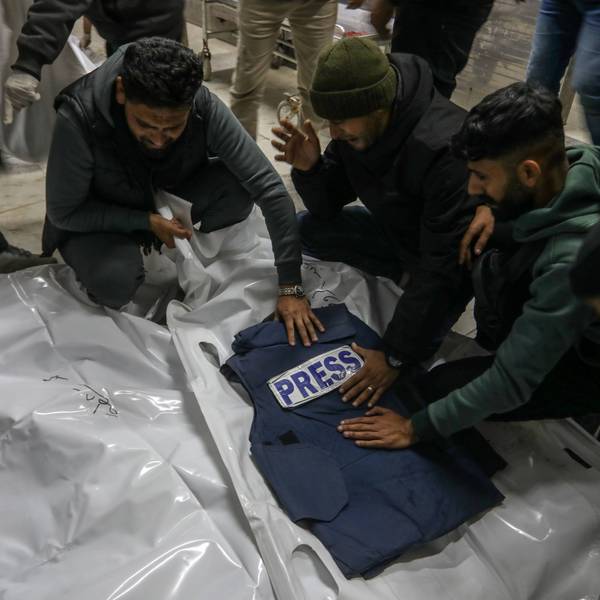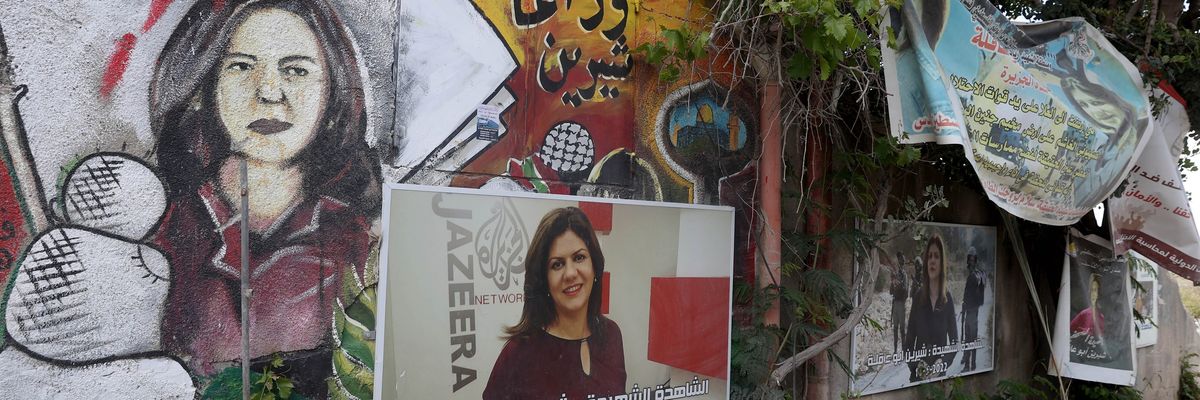The Israel Defense Forces' chief spokesperson outraged people worldwide with a televised interview Thursday, the one-year anniversary of the IDF killing Al Jazeera correspondent Shireen Abu Akleh, who was shot dead as she reported from the occupied West Bank on May 11, 2022.
Noting that there has been "no justice or responsibility taken for her death" since the IDF killed the Palestinian-American journalist, CNN's Eleni Giokos asked Rear Adm. Daniel Hagari, "Is the IDF willing to apologize—ready to apologize?"
Hagari responded: "I think it's an opportunity for me to say here that we are very sorry of [sic] the death of the late Shireen Abu Akleh. She was a journalist—a very established journalist—and in Israel, we are a democracy, and in democracy, we see high value in journalism and in free press. And we want journalists to feel safe in Israel, especially in wartime, and even if they criticize us, we want them to feel safe. It's all about democracy and we are a liberal democracy."
Bloomberg Government reporter Emily Wilkins tweeted that the Israel Defense Forces' apology is "the smallest of steps forward—more must be done to protect working journalists, and the IDF must stop murdering reporters. #JusticeforShireen."
Others were even more critical. Rohan Talbot, director of advocacy and campaigns at Medical Aid for Palestinians, declared that "you don't get to intentionally kill a journalist, then just say, 'oops, sorry,' and hope everyone will just move on. This apology on the anniversary of her killing, without any steps towards accountability, is an insult to her family. Justice must be done."
"Also: Where's the apology for the lies, the smears, the obfuscations, the delays, the gaslighting, the brutal attacks on her funeral?" Talbot added, calling out the IDF for "the most hollow of PR apologies in a naked attempt to draw a line under an open wound."
Israel initially said that Abu Akleh—who wore a helmet and bulletproof vest labeled "PRESS"—was caught in the crossfire between the IDF and Palestinians, but firsthand accounts and multiple investigations over the past year have debunked that claim.
As CNN noted Friday:
A CNN investigation in May last year unearthed evidence—including two videos of the scene of the shooting—that there was no active combat, nor any Palestinian militants, near Abu Akleh in the moments leading up to her death.
Footage obtained by CNN, corroborated by testimony from eight eyewitnesses, an audio forensic analyst, and an explosive weapons expert, suggested that Israeli forces took aim at the journalist.
While the IDF admitted for the first time last September that there was a "high possibility" Abu Akleh was "accidentally" shot and killed by Israeli fire, its Military Advocate General's Office said in a statement that it did not intend to pursue criminal charges or prosecutions of any of the soldiers involved.
Hagari's CNN interview came after the Committee to Protect Journalists (CPJ) earlier this week released a report which reveals that the IDF shooting Abu Akleh in the head with impunity "is part of a deadly, decadeslong pattern" that goes back to at least 2001.
"The killing of Shireen Abu Akleh and the failure of the army's investigative process to hold anyone responsible is not a one-off event," said Robert Mahoney, CPJ's director of special projects and one of the report's editors, in a statement. "It is part of a pattern of response that seems designed to evade responsibility. Not one member of the IDF has been held accountable in the deaths of 20 journalists from Israeli military fire over the last 22 years."
The IDF said in response to the CPJ report that it "regrets any harm to civilians during operational activity and considers the protection of the freedom of the press and the professional work of journalists to be of great importance," adding that Israeli forces do "not intentionally target noncombatants, and live fire in combat is used only after all other options have been exhausted."
Sharif Abdel Kouddous—correspondent for the award-winning documentary The Killing of Shireen Abu Akleh, produced by Al Jazeera's program "Fault Lines"—pointed to the CPJ report during a Thursday Democracy Now! appearance.
After killing journalists, the IDF turns to a "standard playbook, which is preemptive denials of responsibility, pushing false narratives, discounting evidence in the case, and internal investigations that lack any kind of transparency and never lead to charges," he said. "This is exactly what happened in Shireen's case, and it shows that this is a pattern of impunity."
"This is one of the most prominent journalists of her generation, who was killed in broad daylight as she was wearing her press jacket and helmet with the word 'press' clearly visible on them, with much of it caught on camera, with her colleagues there to witness it, with the citizenship of a country that's the main backer of the Israeli military," Kouddous added. "If we can't find justice for Shireen, what chance does anyone in Palestine have?"
He also acknowledged a Thursday statement from Abu Akleh's family, which says in part: "Over the past year, our family has been forced to grieve while seeking justice and accountability for Israel's war crimes. From the beginning, we've called on the U.S. government to act in the same way it would if any other American citizen was killed abroad."
The family noted a Federal Bureau of Investigation probe announced in November—but as NBC News reported Thursday, the FBI has yet to contact Walid Al-Omari, Al Jazeera's regional bureau chief, or Palestinian journalist Shatha Hanaysha, who was with Abu Akleh when she was shot and told the outlet: "There is no serious investigation... It was just talking in the air to kill the story."
Al Jazeera's Ali Harb on Thursday highlighted frustrations that "the Biden administration has done next to nothing to push for accountability in the case," sharing remarks from critics including representatives of Amnesty International USA, Palestine in America magazine, and the think tanks Al-Shabaka and the Arab American Institute.
Meanwhile, Al Jazeera said in a statement Thursday that the Qatar-based media network "renews its appeal to international human rights and press freedom organizations to continue to support Shireen's case and help end impunity for crimes against journalists."
The network "remains committed to its pledge to Shireen's family and colleagues to seek justice for Shireen by pursuing all possible avenues to ensure her killers are held accountable," Al Jazeera added, "including through the International Criminal Court."




